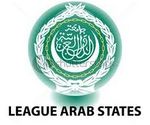Difference between revisions of "League of Arab States"
| Line 29: | Line 29: | ||
==Member States== | ==Member States== | ||
| − | # Algeria # Bahrain # Comoros # Djibouti # Egypt # Iraq # Jordan # Kuwait # Lebanon # Libya # Mauritania | + | # Algeria - joined 1962 |
| − | # Morocco # Oman # State of Palestine # Qatar # Saudi Arabia # Sudan # Syria # Tunisia # United Arab Emirates | + | # Bahrain - joined 1993 |
| − | # Yemen | + | # Comoros - joined 1977 |
| + | # Djibouti - joined 1945 | ||
| + | # Egypt - joined 1945 | ||
| + | # Iraq -joined 1961 | ||
| + | # Jordan - joined 1945 | ||
| + | # Kuwait - joined 1961 | ||
| + | # Lebanon - joined 1945 | ||
| + | # Libya - joined 1953 | ||
| + | # Mauritania - joined 1973 | ||
| + | # Morocco - joined 1958 | ||
| + | # Oman - joined 1971 | ||
| + | # State of Palestine - joined 1976 | ||
| + | # Qatar - joined 1971 | ||
| + | # Saudi Arabia - joined 1945 | ||
| + | # Somalia - joined 1974 | ||
| + | # Sudan - joined 1956 | ||
| + | # Syria - joined 1945 (suspended on November 16, 2011) | ||
| + | # Tunisia - joined 1958 | ||
| + | # United Arab Emirates - joined 1971 | ||
| + | # Yemen - joined 1945 | ||
==Sectors== | ==Sectors== | ||
Revision as of 05:46, 31 May 2012
| Type: | Organization |
| Industry: | Government & Politics |
| Founded: | March 22, 1945 |
| Headquarters: | Cairo |
| Country: | Egypt |
| Website: | arableagueonline.org |
| Key People | |
| Dr. Nabil El Araby, Secretary General | |
The League of Arab States is an organization composed of 22 member states in the Arab Region (North and Northeast Africa and Southwest Asia or Middle East). It was established on March 22, 1946 in Cairo to strengthen the relationship of its member states, co-ordinate their economic, political, cultural, health and social welfare, communications and other activities and to protect their independence, sovereignty and the general affairs and interest of Arab countries. The original members of the League of Arab States include Saudi Arabia, Iraq, Egypt, Yemen, Lebanon, Transjordan (Jordan) and Syria. [1]
The governance of the League of Arab States is executed by a Council, which is comprised of one representative per member state. The Council is mandated to supervise the implementation of agreements made by member states and to determine if it is necessary for the league to participate in international organizations to maintain peace and security as well as economic and social relations in the Arab region. Special Committees prepare draft agreements on specific areas of co-operation between the member states to realize the objectives of the League on different issues. The organization is headed by a Secretary General whose rank is equal to an Ambassador is appointed by the Council. The current Secretary General of the league is Dr. Nabil El Araby.[2]
Member States
- Algeria - joined 1962
- Bahrain - joined 1993
- Comoros - joined 1977
- Djibouti - joined 1945
- Egypt - joined 1945
- Iraq -joined 1961
- Jordan - joined 1945
- Kuwait - joined 1961
- Lebanon - joined 1945
- Libya - joined 1953
- Mauritania - joined 1973
- Morocco - joined 1958
- Oman - joined 1971
- State of Palestine - joined 1976
- Qatar - joined 1971
- Saudi Arabia - joined 1945
- Somalia - joined 1974
- Sudan - joined 1956
- Syria - joined 1945 (suspended on November 16, 2011)
- Tunisia - joined 1958
- United Arab Emirates - joined 1971
- Yemen - joined 1945
Sectors
The different sectors of the organization include:[3]
- Secretary General Cabinet
- Political Sector
- Economical Sector
- National Security Sector'
- Auditing Sector
- Social Affairs Sector
- Palestine Sector
- Media and Communications Sector
- Human Resources Sector
